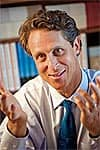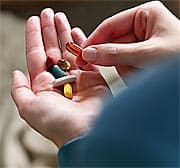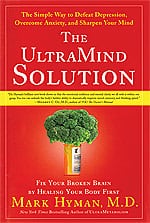Life Extension Magazine®
In his previous book, The UltraSimple Diet (Pocket Books, 2007), Mark Hyman, MD, called himself a “medical detective,” a practitioner of the rapidly emerging field of functional medicine, which searches for the underlying cause of illness instead of merely treating the symptoms. Now, in his important new breakthrough book, The UltraMind Solution: Fix Your Broken Brain By Healing Your Body First (Scribner, 2008), Dr. Hyman calls himself an “accidental psychiatrist,” a physician whose efforts to help people find and eliminate the causes of their physical disorders have led to the surprising discovery that his treatments often cure their mental problems as well. In an exclusive interview with Life Extension magazine, Dr. Hyman, who is the founder and medical director of the UltraWellness Center in Lenox, Massachusetts, talks about his remarkable findings. He explains how problems of the brain, such as depression, anxiety, bipolar disease, attention deficit disorder (ADD), Alzheimer’s disease, Parkinson’s disease, and mood swings can be prevented, improved, or even cured by his innovative program of diet, nutritional supplements, exercise, meditation, and lifestyle changes. Dr. Hyman’s findings are a harbinger of a new approach to dealing with what he calls “broken brains,” representing a more natural, healthy, and effective method that might one day make traditional psychiatric medication and treatment obsolete. Why Functional Medicine?Referring to the widespread incidence and exorbitant cost of treating mental disorders, Dr. Hyman explains that, “Functional medicine is a map or model for addressing a chronic disease epidemic which affects over half of Americans and costs 80% of our health care dollars.” He says that while conventional methods are effective for acute illness, they simply do not do the job with chronic disease. “We need to change access to health care and create improved coverage for our population,” he adds, “But we have to change the type of health care we have access to.” Dr. Hyman says that functional medicine grows out of Western science and predicts, “It will reinvigorate primary care medicine and provide success, where today there is mostly failure, in addressing the epidemic of chronic conditions like heart disease, diabetes, obesity, autoimmune disease, digestive problems, and brain and mood disorders.”
He does not reject scientific medicine and, in fact, the future of scientific medicine is functional medicine. Dr. Hyman also distinguishes functional medicine from alternative or integrative medicine. The key difference lies in functional medicine’s focus on finding the root causes of an individual’s health problems, as opposed to a focus on prescribing alternative treatments such as acupuncture or biofeedback for conventional symptom-based diagnoses. The aim, he says, “Is to navigate through the maze of chronic disease and understand the very few basic things that can go wrong, that can cause a myriad of symptoms and be easily corrected by addressing the root. So if you have depression because you have a vitamin B12 deficiency, or you have a food allergy or you have mercury poisoning or your thyroid is not functioning properly or you’ve had some psychological trauma, each one of these things is different and needs a different treatment.” The Epidemic of Emotional Disorders and Their Causes“We have 1.1 billion people in the world with mood problems or cognitive disorders,” explains Dr. Hyman. “One in 10 Americans is on antidepressants, one in 10 children are on stimulant medication, and one in four people will be affected by major depression during their lifetime. Today, we have a chance to fundamentally address the causes. This has never really been possible before, because we never understood how biology works and how it all fits together.”
As he explains in The UltraMind Solution, “There are only a few, common underlying mechanisms responsible for all disease. Our diet is becoming increasingly toxic, our environment is increasingly toxic, we have significant nutritional imbalances and deficiencies, and we’re under constant stress. The results weigh on us day after day after day.” He adds that while we cannot escape exposure to all environmental toxins, we can avoid many in food, water, and pesticides. “The average person consumes a gallon of neurotoxic pesticides a year,” Dr. Hyman remarks, “And there are 3,500 different additives put into our food supply.” In his new book, he explains that the old idea that the blood-brain barrier acts as an impenetrable shield against harmful elements is no longer sufficient. “What I found,” he says, “Much to my surprise, was that when I treated people for problems with insulin, or when I treated food allergies or when I got people detoxed from heavy metals, their mental problems also went away. Their mood got better, their depression lifted, their dementia reversed. There were children with autism who began to talk again and others I treated for asthma or allergies who suddenly found their attention deficit disorder (ADD) went away. They went from having brain chaos to having healthy inner brain function. And I said, ‘Wow, what’s going on here?’” Does Everyone Need Supplements?Dr. Hyman writes that if people “eat wild, fresh, organic, local, non-genetically modified food grown in virgin mineral- and nutrient-rich soils that has not been transported across vast distances and stored for months before being eaten... and work and live outside, breathe only fresh unpolluted air, drink only pure, clean water, sleep nine hours a night, move their bodies every day, and are free from chronic stressors and exposure to environmental toxins,” then, perhaps, they might not need supplements. For the rest of us, whom he considers to be all of us, supplements are an absolute necessity. His book lists daily nutrients that he considers basic for everyone, including vitamins A, B1, B2, B3, B6, B12, C, D, E, K, carotenoids, biotin, choline, and inositol; macrominerals calcium, chloride, magnesium, phosphorus, potassium, sodium, and sulfur; trace minerals copper, iodine, iron, manganese, molybdenum, selenium, vanadium, zinc, boron, chromium, and silicon; essential amino acids tryptophan, meth-ionine, phenylalanine, threonine, valine, leucine, isoleucine, and lysine; and essential fatty acids linoleic acid, gamma-linolenic acid (GLA), alpha-linoleic acid (ALA), eicosapentaenoic acid (EPA), and docosahexaenoic acid (DHA). “Think of nutrients as fertilizer for your brain,” Dr. Hyman says. “Think of them as little helpers that improve communications and connections.” He believes that approximately 80% of us will do well and maintain a healthy brain on basic supplements (combined with a healthy lifestyle and diet), including a high-quality multivitamin; calcium and magnesium; vitamin D3, omega-3 fatty acids; probiotics; and the methylation factors folic acid, B6, and B12. Better Diet, Better BrainDr. Hyman has a simple two-fold approach for improving both brain and body: take out the bad stuff and put in the good stuff. He pinpoints a few dietary elements as causes of major mental and physical problems, urging us to eliminate them from our menu: gluten and dairy, which he calls “staples of our American diet;” sugar and high-fructose corn syrup; trans or hydrogenated fats, which he calls “markers of poor quality food;” and artificial sweeteners.
“Hidden food allergies are a major unrecognized epidemic in the twenty-first century,” he asserts, adding that most of us fail to make the connection between what we eat and what we feel. “Optimal nutrition is the most important factor in keeping your brain healthy,” says Dr. Hyman. “Feeding your brain is not something most of us know how to do.” He explains that most doctors know little or nothing about proper nutrition, something that is slowly beginning to change, as it becomes more evident that “vitamins and minerals are so essential for brain function and health.” Pinpointing carbohydrates as “the single most important food for long-term health and brain function,” Dr. Hyman advises eating “real, whole food as it comes from the earth,” including fresh vegetables, fruit, beans, whole grains, nuts, seeds, herbs, and spices, and lean animal protein such as fish, chicken, and eggs. Ideally, should we eat only organic food? “It’s preferable,” he responds, “But not necessary. If it’s a choice of eating organic or getting off gluten and dairy, get off the gluten and dairy.” He also advises eating food that is as low as possible in pesticides, and recommends checking the website of the Environmental Working Group (www.ewg.org), which lists the latest figures on amounts of pesticides in foods.
Environmental ToxicityDr. Hyman is especially aware of the dangers of environmental toxins because early in his career, he worked in China for a year and was exposed on a daily basis to air polluted with coal dust and mercury. When he began to experience many symptoms of a “broken brain,” after returning home, such as insomnia, exhaustion, depression, anxiety, and memory loss, Dr. Hyman was finally diagnosed with mercury poisoning and went through a course of treatment before recovering. Based on this personal experience, the connection between brain disorders and environmental toxins became very clear. Realizing that such problems are far more common than most of us realize, Dr. Hyman advises the following: “Filter your water, stay away from large, predatory fish, try to eat organic food whenever possible, and find out the levels of pesticides in the food you eat.” The higher up the food chain you go, the greater the likelihood of toxins, so he recommends eating low on the food chain—for example, sardines rather than swordfish. Important Lifestyle FactorsAs part of his program, Dr. Hyman emphasizes the need to confront the harm that daily stress does to our minds and bodies (which includes increasing levels of cortisol), and to be proactive in diminishing this contributor to “broken brains.” He mentions the importance of a good night’s sleep, noting findings that Americans are sleep-deprived, which can have a powerful effect on brain function. As an example, he points to indicated links between sleep deprivation and Alzheimer’s disease. He also recommends regular meditation, which improves mood and cognitive function, yoga, deep breathing, laughter therapy, biofeedback, making love, hypnosis, and exercise, and advises everyone to do at least one every day. | ||||||
Nutrigenomics
Not too long ago, it was thought that you are born with certain genes and you are simply stuck with them. Now, we are beginning to explore the world of “gene expression,” finding that we can often control the way our inherited genes manifest themselves. Dr. Hyman finds this discovery both challenging and significant. “There’s a whole new emerging science called nutrigenomics,” he says, “And it’s extremely exciting to see that changes in the diet can have extraordinary effects on changing the way your genes are working or not working.” He cites a recent study that put two groups of obese men and women on diets with identical calories, but different sources of carbohydrate: one group ate wheat, oats, and potatoes, while the second group ate rye and pasta. “Rye has unique properties called phytonutrients,” he explains, “And they actually improve insulin sensitivity.” After 12 weeks on these diets, the scientists looked at DNA expression patterns and found that about 60 genes that promote obesity, inflammation, oxidative stress, and diabetes were turned on in the group that ate wheat, oats, and potatoes, while the group that ate rye and pasta had more than 70 genes that did the reverse.” Dr. Hyman points to this study as important evidence that we can use food and nutrients as medicine, and use them very effectively for the prevention of many health disorders. Staying YoungBalancing hormones is also a part of Dr. Hyman’s program. He notes that in the US, there are three big epidemics of hormonal imbalance: too much insulin (from sugar intake); too much cortisol and adrenaline (from stress); and not enough thyroid hormone. He says that all three interconnect and affect our sex hormones. “I believe that most of the symptoms of aging we see are really symptoms of abnormal aging or dysfunction that are related to imbalances in our core body systems,” he concludes. Dr. Hyman recommends bioidentical hormones, which he says can be “life-saving” when used correctly. How the Doctor Stays WellAs a physician who is strongly motivated to solve medical puzzles, Dr. Hyman has paid close attention to his own health since his bout with mercury poisoning. “I have the unique benefit of knowing my particular genetic potholes,” he says, “And I also know I had chronic fatigue and work very hard, so I take a number of supplements to help me deal with that.” Dr. Hyman’s personal supplement program includes the following:
Dr. Hyman’s overall wellness plan? “I keep my gut healthy, keep myself free of toxins, and keep my mitochondria healthy. I exercise at least four or five times a week, get enough sleep, eat whole, real food, keep my sugar intake at a minimum, enjoy alcohol as a treat once in a while, and make sure I hit the pause button every day or two.” A Life With GoalsIn The UltraMind Solution, Dr. Hyman writes, “My goal for all of you is to live your life as you were meant to live it—a life full of energy, vitality, pleasure, and happiness.” Noting that, “The brain is not disconnected from the rest of the body as many practitioners of conventional medicine would have you believe,” he hopes to change the way we treat mental problems and help us realize that the causes often lie in places where we haven’t been looking: our diet, nutrient deficiencies, and toxins that have invaded our bodies. “The future of medicine is personalized treatment, not ‘one size fits all,’” he explains. In his campaign to bring the principles of functional medicine to a wider population, Dr. Hyman recently met with senators from the working group on health care reform in Washington. He hopes the results will be evident in the new administration’s approach to health care.
“I told them that we have to keep up with the rest of the developed nations, in which we are 19th out of 19 in all health care outcomes,” he says. “We have to stop pharmaceutical advertising on television, we have to stop junk food marketing to children, because 40% of the time, when patients are in their doctor’s office and request something they saw on television, they get it. The government has to protect us from that and I think it’s a critical issue that has to be dealt with. “The other thing is that we need to retrain our doctors and train a new generation of doctors to think and practice in a way where drugs will be one tool, but not the only tool. I’m concerned about using the right tool for each person at the right time.” Dr. Hyman adds that, “Our goal in medicine should be to find the right ‘medicine’ for each person, without prejudice, whether it is a drug, a nutrient, diet change, detoxification, a hormone, exercise, or exorcism!” In addition, Dr. Hyman has been helping to train physicians in functional medicine. “The Institute for Functional Medicine has trained over 1,000 practitioners, including 50 academic physicians and fellows from 20 major medical schools who are going through the program,” he explains.“We have research projects starting at Harvard and we’re putting together a certification program in functional medicine.” For Dr. Hyman, spreading the word through books, lectures, seminars, and meetings is the easy part. “The hardest part of being a doctor is helping people connect to why they want to heal,” he says. In this pursuit, Dr. Hyman tries to understand each individual, what that person wants, what is important to him or her, and what provides “meaning and purpose.” In his latest book, Dr. Hyman offers a new and revolutionary way of seeing brain disorders in a positive, encouraging format that is readily accessible to anyone willing to try it. He constantly reminds us that we need to forget the old idea that the cause of a “broken brain” is totally within the brain and can only be helped through psychotherapy and drugs. He tells us that we need to think in a new way and realize that most of these difficulties are caused by biological imbalances that can be corrected. “What you do to your body you do to your brain,” Dr. Hyman says. “Heal your body and you heal your brain.” Dr. Mark Hyman is the founder and medical director of the UltraWellness Center in Lenox, Massachusetts. He is the author of numerous books including The UltraMind Solution, The UltraSimple Diet, and UltraMetabolism. If you have any questions on the scientific content of this article, please call a Life Extension Health Advisor at 1-800-226-2370.
|






